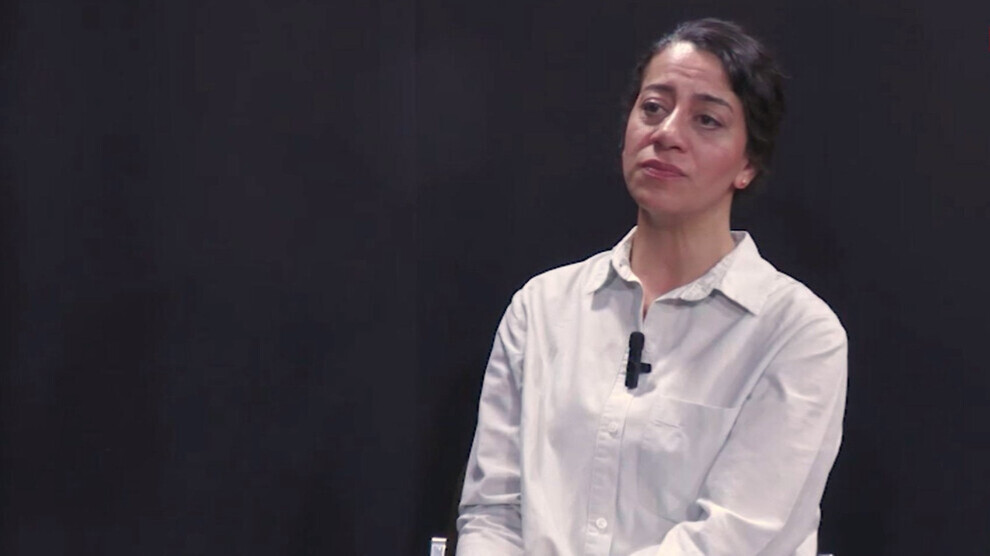‘The Yazidi community could only preserve its existence through resistance’
One hundred years after the Treaty of Lausanne, various Kurdish movements are trying to build a political consensus against the genocidal policies in Kurdistan.
One hundred years after the Treaty of Lausanne, various Kurdish movements are trying to build a political consensus against the genocidal policies in Kurdistan.

One hundred years ago, on 24 July 1923, Kurdistan was divided among the states of Turkey, Iraq, Iran and Syria by the Treaty of Lausanne. On the occasion of the anniversary, Kurdish parties and organisations are protesting against the agreement and demanding a status. Çiçek Yıldız is co-chair of the Yazidi European Coordination and spoke to ANF about the history and impact of the Treaty of Lausanne.
Çiçek Yıldız said that the genocide of the Yazidi community, the repeated massacres and the expulsion from their settlement areas are a result of the Treaty of Lausanne: "What does the Treaty of Lausanne mean for us? What have we experienced in this century? Kurdish society knows the Treaty of Lausanne well. This treaty has kept the genocide of the peoples of the Middle East alive in its own reality for a hundred years. The fragmentation of Kurdistan began in the 17th century when it was divided in two between the Iranian and Ottoman states. Subsequently, they did not want the Kurdish people to live as a nation with its own will in the geography of Kurdistan. One hundred years ago, the territory of Kurdistan was divided by the new Turkish state under the leadership of Britain and France, the most influential imperialist states of the time. The aim was not only the division of Kurdistan, but also a genocide of the Kurdish people. The nations that had been entrenched in Kurdistan for a thousand years were also part of this policy. In this treaty, the will of the international powers was shaped according to the wishes of the Turkish state."
"We could only preserve our existence through resistance"
Remarking that the Treaty of Lausanne was based on the total annihilation of the Kurdish people, Yıldız stated: "The different religions, languages and historical beliefs in Kurdistan were not taken into account. The oldest of these faiths is the Yazidi faith. It was also the target of this policy. However, the Yazidis have an ancient tradition; they have not submitted to any ruling power for thousands of years. They have resisted throughout history and continue to resist today. They will impose their will through this tradition of struggle. The aim of the Treaty of Lausanne was the destruction of societies in the region, the enmity between religions and the non-acceptance of differences. The implementation of the massacres against the Yazidi community took place on the ground created by the Treaty of Lausanne. They were implemented by the newly established fascist Turkish state. Against this, historic resistance developed in the Yazidi community. Thanks to this resistance, it was able to preserve its existence. One of the aims of the establishment of the Turkish state was to destroy the different communities, languages and religions through tyranny and genocide. Our society prevented this policy of annihilation through its resistance. Through this resistance, the communities living in the region drew hope and did not give up. This gave morale and strength to these communities and empowered them to resist.”
Yıldız continued: “In the last century, genocide was practised through massacres, expulsion and changing the demographic structure, but also through erasing the historical memory of society. For the occupation of Kurdistan, all brutal methods were tried on society. In the last century, there were massacres in Kocgirî (1925), Dersim (1937-38), Gelîyê Zîlan and other places. The uprisings of Şêx Seîd, Seyîd Riza, Agirî and Qazî Mihemed were put down by the occupying states because there was no national unity. In this last century, Kurdistan was plundered, crimes were committed against the Kurdish people. At the same time, there has always been resistance. And in the last 50 years, the Kurdish people have resisted under the leadership of the freedom movement and with the philosophy of Leader Apo (Abdullah Öcalan). The Kurdish national spirit has reawakened. The unity formed today has renewed the future hopes of the peoples of the region and prevented the Treaty of Lausanne from achieving its goal. They wanted to conclude the genocide of the Kurdish people, but they failed."
The Yazidi community demands self-determination
The Yazidi community has preserved its existence by resisting the genocide mentality, said Çiçek Yıldız, adding: "Today's conditions are not the conditions of a hundred years ago. The world is no longer the old world. The policies of the imperialist states have also changed according to the new world. In every respect, the old and today's conditions are not the same. The Yazidi community has formed a will. It will not accept any policy imposed in any way from outside. As a society, we fight for self-determination and reject any policy that is decided without our participation."
For a consensus in Kurdish politics
Yıldız noted that Yazidi institutions will also be represented at the conference, which will take place on 22 and 23 July in Lausanne and which will be attended by numerous Kurdish political movements. She concluded: "We think it is important to discuss the national unity of the Kurdish people at this conference. Our priority is the unity of the Kurds. We attach importance to Kurdish politics acting together. The Kurdish people also demand unity. Those who will lead this are our political movements, politicians and intellectuals. They should act in alliance against the occupiers and defend a clear national policy. They must protect the existence and the future of the Kurdish people. The existence of all peoples and nations is based on their own politics. For the Kurdish people, national unity is very important today."